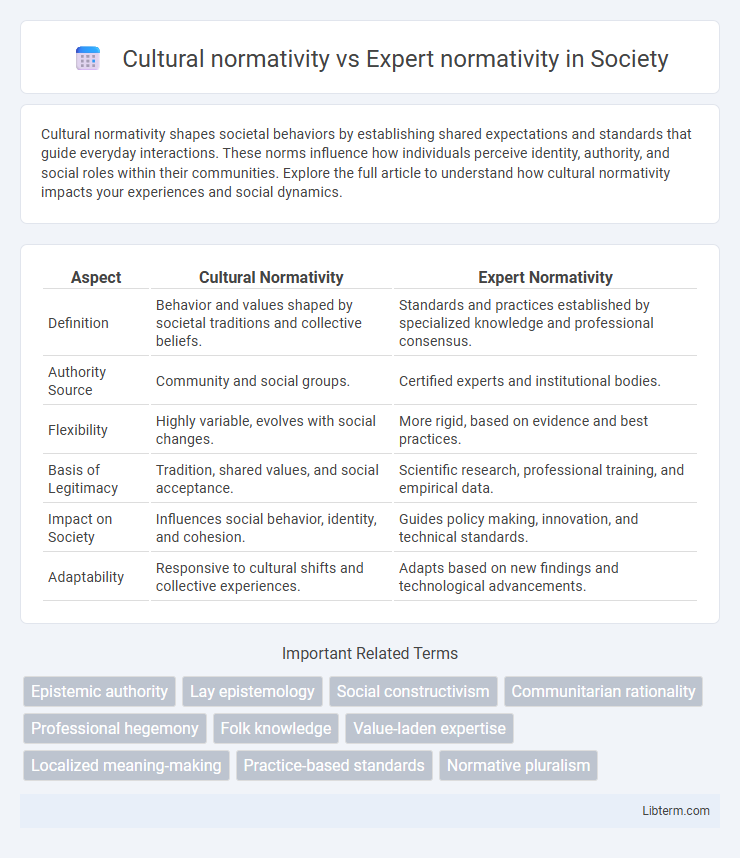Cultural normativity shapes societal behaviors by establishing shared expectations and standards that guide everyday interactions. These norms influence how individuals perceive identity, authority, and social roles within their communities. Explore the full article to understand how cultural normativity impacts your experiences and social dynamics.
Table of Comparison
| Aspect | Cultural Normativity | Expert Normativity |
|---|---|---|
| Definition | Behavior and values shaped by societal traditions and collective beliefs. | Standards and practices established by specialized knowledge and professional consensus. |
| Authority Source | Community and social groups. | Certified experts and institutional bodies. |
| Flexibility | Highly variable, evolves with social changes. | More rigid, based on evidence and best practices. |
| Basis of Legitimacy | Tradition, shared values, and social acceptance. | Scientific research, professional training, and empirical data. |
| Impact on Society | Influences social behavior, identity, and cohesion. | Guides policy making, innovation, and technical standards. |
| Adaptability | Responsive to cultural shifts and collective experiences. | Adapts based on new findings and technological advancements. |
Defining Cultural Normativity and Expert Normativity
Cultural normativity refers to the set of behaviors, values, and practices that are widely accepted and upheld within a specific society or community, shaping individuals' understanding of what is considered normal or appropriate. Expert normativity, by contrast, is grounded in specialized knowledge and professional standards established by authorities or experts within a particular field, guiding decision-making and actions based on empirical evidence and technical competence. These two forms of normativity can intersect or diverge, influencing social expectations and authoritative judgments in distinct ways.
Historical Contexts: How Norms Evolve
Cultural normativity arises from collective social practices and shared values within historical contexts, reflecting traditions that evolve over generations through communal experiences. Expert normativity is shaped by specialized knowledge and professional standards that develop alongside advancements in science, technology, and institutional authority. The historical evolution of norms reveals a dynamic interplay where cultural values adapt to or resist emerging expert insights, illustrating shifts in societal priorities and epistemic frameworks over time.
Sources of Authority: Culture vs. Expertise
Cultural normativity derives its authority from shared traditions, social practices, and collective values within a community, influencing behavior based on long-established customs. Expert normativity bases its authority on specialized knowledge, credentials, and empirical evidence, guiding decisions through rigorous analysis and professional consensus. The tension between these sources of authority shapes social dynamics by balancing intuitive cultural understanding with validated expert judgment.
Mechanisms of Influence in Society
Cultural normativity shapes behavior through deeply embedded traditions, shared values, and collective identity, guiding individuals via socialization and communal reinforcement. Expert normativity exerts influence by establishing specialized knowledge standards, relying on authority, empirical evidence, and institutional trust to direct decision-making. Both mechanisms interact dynamically, with cultural norms framing societal acceptance while expert norms drive innovation and policy through authoritative expertise.
Case Studies: Conflicts and Convergences
Case studies examining cultural normativity versus expert normativity reveal conflicts where local traditions clash with professional standards, impacting policy implementation and community acceptance. Instances in healthcare show tensions between indigenous healing practices and biomedical protocols, highlighting the need for culturally sensitive integration. Convergences emerge when experts incorporate local knowledge, fostering collaborative models that respect diversity while maintaining scientific rigor.
Impact on Public Policy and Governance
Cultural normativity shapes public policy by reflecting the values, beliefs, and practices of a community, ensuring policies resonate with societal expectations and promote social cohesion. Expert normativity introduces evidence-based, specialized knowledge into governance, emphasizing efficiency, technical accuracy, and long-term outcomes. Balancing these normative frameworks is critical for creating policies that are both culturally sensitive and scientifically sound, enhancing legitimacy and effectiveness in governance.
Navigating Ethical Dilemmas
Navigating ethical dilemmas requires balancing cultural normativity, which reflects shared values and practices within a community, with expert normativity, grounded in specialized knowledge and professional standards. Conflicts often arise when culturally ingrained behaviors clash with expert ethical codes, necessitating a nuanced approach that respects cultural diversity while upholding universal principles. Effective resolution demands context-sensitive frameworks prioritizing dialogue, cultural competence, and adherence to evidence-based professional ethics.
Challenges to Legitimacy and Acceptance
Cultural normativity often faces challenges in legitimacy due to its subjective and community-specific nature, which can conflict with the universal claims of expert normativity grounded in empirical evidence and specialized knowledge. The acceptance of cultural norms may be questioned when expert norms emphasize standardized practices that overlook local values or traditions. This tension between cultural and expert normativity requires careful negotiation to balance respect for diverse perspectives with the credibility and authority of expert knowledge.
The Role of Education in Shaping Normativities
Education plays a critical role in shaping both cultural normativity and expert normativity by transmitting societal values and specialized knowledge. Curricula often reflect dominant cultural norms while simultaneously promoting expert standards in science, ethics, and professional practices. This dual influence helps individuals navigate everyday social expectations and expert-driven frameworks in various fields.
Future Trends: Bridging Cultural and Expert Perspectives
Future trends in normativity emphasize integrating cultural normativity, which reflects community values and social practices, with expert normativity grounded in specialized knowledge and evidence-based standards. Emerging frameworks leverage interdisciplinary collaboration and adaptive technologies to create normative models that respect cultural diversity while maintaining scientific rigor. This convergence aims to enhance decision-making processes in areas such as public health, environmental policy, and technology ethics by fostering inclusive yet authoritative guidelines.
Cultural normativity Infographic

 libterm.com
libterm.com